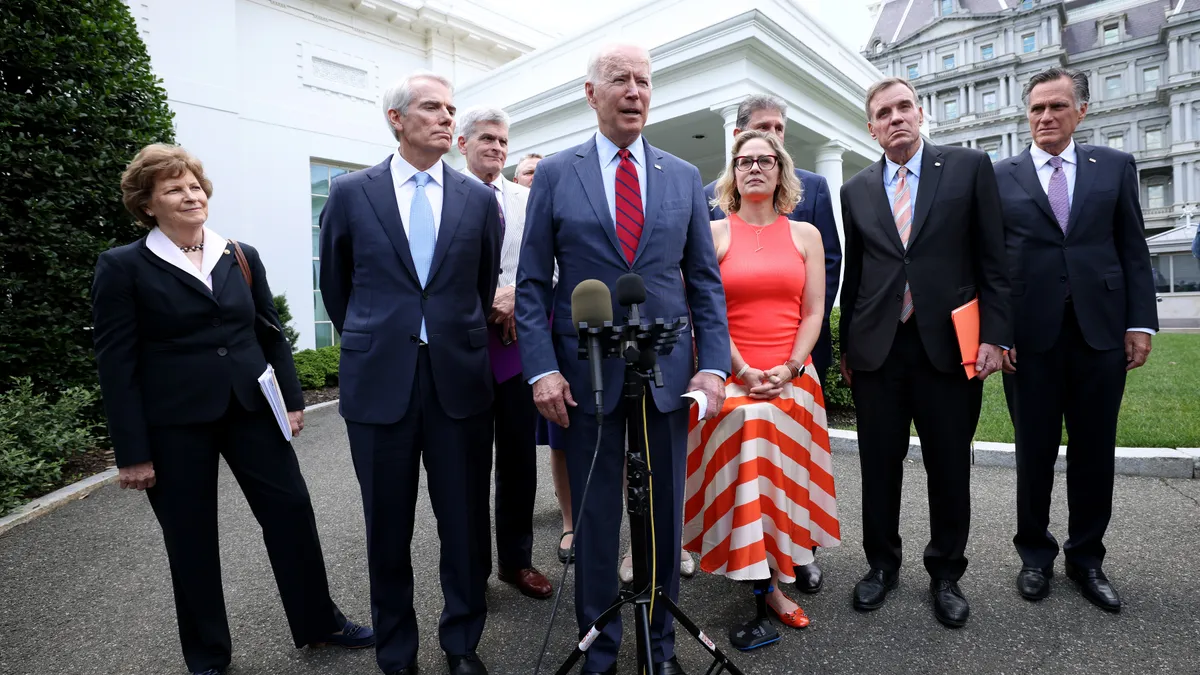Dive Brief:
- After several weeks of negotiations, President Biden and a group of Republican and Democratic senators announced a deal on infrastructure spending Thursday.
- The plan, encompassing $973 billion of investment over five years and $1.2 trillion if continued over eight, includes nearly $600 billion in new spending and focuses on funding for roads, railways, bridges, water facilities and broadband internet. Biden's original infrastructure proposal, released in March, had a price tag of more than $2 trillion.
- The bipartisan deal is far from a sure thing. Despite the bipartisan compromise, Biden said Thursday that he will not agree to any legislation unless it is paired with another bill addressing other elements of his original infrastructure proposal such as child care tax investments. "If this is the only thing that comes to me, I'm not signing it," he said.
Dive Insight:
During the bipartisan negotiations, a key issue has been how to pay for the plan, with Republicans opposed to undoing any of their 2017 tax cuts and Biden against raising the gas tax. The proposal released yesterday would be funded by a combination of increased tax enforcement, unused unemployment insurance, unused coronavirus relief funds, state and local funds for broadband, sales from the Strategic Petroleum Reserve and several other measures, the White House said.
Here is what the proposal includes, according to a White House fact sheet:
| Transportation | $312 billion total |
|---|---|
| Roads, bridges, major projects | $109 billion |
| Passenger and freight rail | $66 billion |
| Public transit | $49 billion |
| Airports | $25 billion |
| Infrastructure financing | $20 billion |
| Ports and waterways | $16 billion |
| Safety | $11 billion |
| Electric vehicles | $7.5 billion |
| Electric busses/transit | $7.5 billion |
| Reconnecting communities | $1 billion |
| Other infrastructure | $266 billion total |
| Power, including grid authority | $73 billion |
| Broadband | $65 billion |
| Water | $55 billion |
| Resilience | $47 billion |
| Environmental remediation | $21 billion |
| Western water shortage | $5 billion |
Construction industry reaction to the announcement was mixed, with Associated Builders and Contractors saying it was encouraged by the progress but worried about what the other piece of legislation will contain.
"ABC remains concerned with the two-pronged approach emerging from Democrats in Congress and the Biden administration, which would seek to pair this agreement with a subsequent effort to use the budget reconciliation process to enact partisan tax hikes and restrictive labor policies concurrent with any potential bipartisan agreement," CEO Michael Bellaman said in a statement shared with Construction Dive.
The Biden administration has long said that any infrastructure plan should support the growth of union jobs, but Bellaman said ABC supports open competition that does not restrict projects to using only union workers.
"Any infrastructure package should ensure that small construction businesses, which make up 99% of the industry, flourish through fair and open competition, which means the Biden administration and Congress must avoid enacting partisan policies such as the Protecting the Right to Organize Act, government-mandated project labor agreements and a one-size-fits-all approach to workforce development," Bellaman said. "A bipartisan deal should mean everyone is welcome to rebuild America, regardless of whether they are affiliated with a labor union."
The American Society of Civil Engineers said it was encouraged by the announcement, noting that deteriorating infrastructure deficiencies will cost American taxpayers if swift action is not taken.
"We commend this group of Senators for their leadership, and urge the full Congress to act quickly on the agreed upon framework and pass legislation next month," said ASCE President Jean Louis Briaud in a statement shared with Construction Dive.














